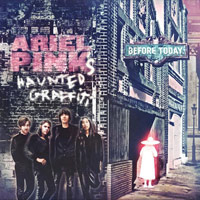
Pure Moods ep
Drag City
Undoubtedly, when the Wooden Shjips appeared from out of the ether a few years back, they made a purpose of changing the face of modern psychedelia. With those initial singles, it wasn’t so much about taking a journey via precision chops and riffs (though they are certainly capable of doing so), it was all about laying in the groove for minutes at a time, without even a casual excursion out of the boundaries of said groove. Chicago’s Cave is of that cloth—a cultish, hirsute, trio of choogle worshippers, intent on maintaining a groove that transcends mere jamming in the garage.
After a couple of limited tape releases, comes the group’s debut for Drag City. At only three songs, Pure Moods is still a potent monster due to the expansive breadth of Cave’s incessant groove. Unlike Wooden Shjips, though, their dynamics aren’t as obfuscated. Sure a solo or two veers off into distorted skree and fogs the windshield, but for the duration, theirs is a connection of primal instinct, everything laid on the surface as to let the listener take any path they choose, be it drums, organ or Cooper Crain’s shamanistic approach to guitar. Beyond the groove, it’s echoes that fortify these monuments. “Teenagers” for example, reaches an apex at its center, similar to the crescendo in “When the Music’s Over” stuck on repeat, trapped in a nitrous balloon. If you’re looking for trip-inducing windows to escape from, Cave provides them. As far as the direction that modern psychedelia has taken, I’ve been a bit nonplussed with the frequent caterwauling of a Comets on Fire or the incessant bombast of Boris. A band like Cave is intelligent enough to find the happy medium in between. On the finale of Pure Moods, “Brigitte’s Trip (White Light/White Jazz),” the trio is exceptional in juggling all of their influences on one lazy river of cosmic boogie. Dirty British blues, motorik chug, improvised fusion, and stargaze ambience all blend into something more soothing than exploratory and visceral. That they can get comfortable in those shoes is testament to what they’re likely to do with the future—that is, to simply freak out, in the groove of course.
Kevin J. Elliott

We Are Born
Monkey Puzzle/Jive
After years of obscurity as a solo artist, Sia managed to breakthrough as the featured vocalist for downtempo act Zero 7. Her profile then went supernova when “Breathe Me” was used in the series finale of HBO’s Six Feet Under. Riding the wave of new attention, she released the well received Some People Have Real Problems. While she hasn’t managed to re-achieve that level of notoriety, in shades of Björk writing Madonna’s “Bedtime Stories,” she’s become the go-to songwriter for Christina Aguilera’s upcoming Bionic, but until that meeting of the blondes is released, Sia has returned with We Are Born.
While Sia is most often categorized as downtempo, We Are Born seeks to shatter that perception. It’s an unapologetic pop record, with the dancefloor very much in mind. There’s almost nothing here that would score a tearful movie scene or make the cut for a “delicate music for sensitive souls” mixtape. On this outing Sia channels a mix of Lily Allen, Lady Miss Kier (Deee-Lite), Amy Winehouse and shades of Robyn. The closest touchstone is the period in the ’80s when folks like Scritti Politti, ABC and countless others did their best versions of black pop radio. That’s not to say that it’s a throwback record, but it does recount a time when there was a slightly more soulful twist on pop music.
We Are Born is a smart mix between electronic sounds and a crack live band. One of the best examples of that blend is “You’ve Changed,” a strutting nü-disco number that defies you to stand still. However, even the straight analogue songs will have you throwing your hands in a careless manner. But if breaking a sweat is very much on Sia’s mind, she also keeping in mind that time of night when the “ugly lights” come on, and it’s time for a little introspection. “Be Good to Me” is a slow-burning R&B plea for a little affection, while “The Co-Dependant” is a look at a relationship that should probably be on the endangered list. Then she brings it all home with a cover of Madonna’s “Oh Father.” If nothing else, We Are Born shows that Sia is someone to keep your eye on because you never know what she’ll come with next.
Dorian S. Ham
MP3: “You’ve Changed”

The Black Dirt Sessions
Partisan
Deer Tick isn’t afraid to acknowledge its influences. The quartet’s website, for instance, prominently notes its propensity to insert covers by everyone from Hank Williams to the Sex Pistols into its live set. With the band’s eyes seemingly fixated on its forefathers, one might legitimately wonder whether Deer Tick can forge its own voice. To that extent, the Providence, Rhode Island group’s third album, The Black Dirt Sessions, finds the band taking a significant step forward toward that goal.
Throughout the record, the group sounds particularly comfortable with its brand of folk-tinged rock, willing to explore a wide range of dynamics. The majority of the album’s songs take on a tone that is decidedly darker than the band’s previous material, and the subject matter seems particularly suited to singer John McCauley’s gruff voice. While the album isn’t entirely gloomy (opening tracks “Choir of Angels” and “Twenty Mile” are more upbeat, and at times, uplifting), “Goodbye, Dear Friend” sets the tone for The Black Dirt Sessions with lyrics that explore death and loss and a mournful piano sound that gives the song a dirge-like quality while still avoiding coming off as cliched.
Some tracks, like “Piece By Piece and Frame By Frame” and “The Sad Sun,” are notably sparse laments, featuring vocals and acoustic guitars with little other adornment. “Mange” finds the band taking an interesting detour, incorporating some psychedelic elements into a drone rocker that culminates with a guitar solo that sounds like it could have come from Beggars Banquet. The album ends with “Christ Jesus,” which previously appeared on Deer Tick’s 2007 debut and benefits from a new piano-driven arrangement that caps the album in fittingly poignant fashion, with the song’s narrator grasping for some kind of spiritual relief, in a sense mirroring the band’s own search for its place in the rock continuum.
Ron Wadlinger
MP3: “20 Miles”

Fish Market Part 2
Decon
The first edition of Fish Market was a collection of stuff that didn’t fit onto former member of Jurassic 5 and Ozomatli Chali 2na’s official solo album. At that time he also announced this release, which is full of the stuff that didn’t make it onto the first version. So this is the leftovers from the leftovers? Mixed by DJ Dez Andres, it holds together well enough under the pretense that it’s a casual collabo between a couple of buddies.
Chali’s got a fantastic baritone instrument, one of the most unique in hip-hop right now and Dez brings enough neck-snapping beats to satisfy the most discerning backpackers (despite a penchant for overly dramatic synths), but the release suffers from its mixtape status. Some tracks barley qualify as songs and sometimes (like “2 Much”) they've only just gotten a groove going when they terminate and move-on to something else. I keep expecting someone to shout “And now... this!” More than a few tracks were obviously conceived around the hook-line, as if any song with a title like “Step Yo Game Up” is destined to be club classic.
Download-worthy cuts include “Across the Map,” with the underground-ubiquitous, criminally underrated J-Live, the gleefully sloppy “Focused Up,” and the album’s highpoint, “No Bad Man,” featuring the Kingston patter of Tanya Stephens.
Matt Slaybaugh

Before Today
4AD
Before today, Ariel Pink’s body of work has always been a tough sell to anyone who wasn’t in on the sleight-of-hand presented through his subterranean and forcefully lo-fi image of pop music. Those who chose to dig deep enough through the muck and water-damaged tape. though, were rewarded handsomely. It was like discovering an AM gold radio transmission lost in a time warp. It was almost as if one had to fantasize what a song such as “Let’s Build a Campfire There” could become in the hands of Phil Spector or Bob Ezrin and then revel in that fantasy. Regardless of genius or well-oiled in-joke, throughout the collection of gems unearthed over the last decade, there has always been a sense that Pink was completely capable of making a record as simultaneously ambitious and leftfield as Before Today. And in line with the album’s nostalgic veneer, dust-covered and gritty, free-form and sincere songwriting, this is his Ziggy Stardust and the Haunted Graffiti, his Spiders from Mars. Among a post-ironic culture, wherein chopped and screwed new-age is revived as “chillwave” and boner records by guys like Marty Balin and Christopher Cross are given fresh legs, Ariel Pink hovers over it all with a puppeteer’s dexterity, pulling all the right strings at all the right times in creating a grotesque, yet strangely comforting, repurposing of a nostalgia that never actually happened. Therefore, the songs here nearly revel in their own invention, their own forward propulsion. You’ve heard it all before, yet you haven’t.
Those invented wafts of nostalgia are so uniquely intertwined on Before Today that they remain impossible to connect to anything tangible from the era in which they were cultivated. The stunning centerpiece, “Round and Round,” is a creamy soft-rock implosion, but underneath that air-conditioned breeze and spotlighted chorus bubbles vortex synths and layers of organic whoosh, the reverb so enchanting you’re instantly transported to a shag-carpet studio blocks off of Sunset Boulevard (circa 1978). These rifts in the time-space continuum are what feed the Haunted Graffiti, who, for Pink, are a hand-picked band chosen for their abilities to channel the past and produce for him the four-dimensional, sensory overload that is Before Today. “Beverly Kills” tastes, smells, and feels like a lounge act, twinkling poolside, the band confident in their prowess over both swank masculinity and neon keytars. Before Today is a record keenly aware that the ’70s were built on event records, big conceptually driven monoliths, and songs like “Butt-House Blondies” and “Little Wig” execute those grand ideals with a deft balance between Alice Cooper and Blue Oyster Cult’s on-the-corner decadence and Electric Light Orchestra and Roxy Music’s penchant for drama and overblown productions. Honestly, though, as previously mentioned, trying to connect the dots is a fruitless exercise. Enjoying the sunset glitz and kitch of “Can’t Hear My Eyes” and exploring the roots of the sultry sax solo in rock music are two different exercises not worth mentioning in tandem. The bottom line is that Ariel Pink has deceivingly had this kind of record in his back pocket for years. It just took the imagineers of Haunted Graffiti, a top-grade studio, and a wildly divergent perspective on what constitutes lite psych to bring this masterpiece to reality.
Kevin J. Elliott
MP3: “Round and Round”
ALBUM REVIEWS
Wild Nothing, Gemini
The Futureheads, The Chaos
Damien Jurado, Saint Bartlett
Melvins, The Bride Screamed Murder
Born Ruffians, Say It
CocoRosie, Grey Oceans
Jamie Lidell, Compass
Andy Bell, Non-Stop
First Aid Kit, Drunken Trees EP
Hoodoo Gurus, Purity of Essence
The National, High Violet
Band of Horses, Infinite Arms
Audio Bullys, Higher Than the Eiffel
Japandroids, No Singles
